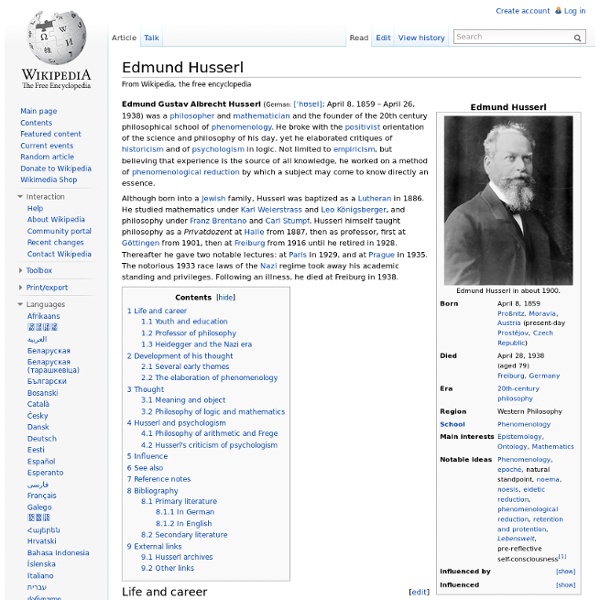Pre-established harmony
Overview[edit] Leibniz's theory is best known as a solution to the mind–body problem of how mind can interact with the body. Leibniz rejected the idea of physical bodies affecting each other, and explained all physical causation in this way.
Phenomenology (philosophy)
Phenomenology (from Greek: phainómenon "that which appears" and lógos "study") is the philosophical study of the structures of experience and consciousness. As a philosophical movement it was founded in the early years of the 20th century by Edmund Husserl and was later expanded upon by a circle of his followers at the universities of Göttingen and Munich in Germany. It then spread to France, the United States, and elsewhere, often in contexts far removed from Husserl's early work.[1] Phenomenology, in Husserl's conception, is primarily concerned with the systematic reflection on and study of the structures of consciousness and the phenomena that appear in acts of consciousness.
9780192800862.001
(c.400 bc–350 bc) Greek astronomer and mathematicianBorn in Cnidus, which is now in Turkey, Eudoxus... ... Access to the complete content on Oxford Reference requires a subscription or purchase. Public users are able to search the site and view the abstracts and keywords for each book and chapter without a subscription.
Nicolas Malebranche
Nicolas Malebranche, Oratory of Jesus (; French: [nikɔlɑ malbrɑ̃ʃ]; 6 August 1638 – 13 October 1715), was a French Oratorian[1] priest and rationalist philosopher. In his works, he sought to synthesize the thought of St. Augustine and Descartes, in order to demonstrate the active role of God in every aspect of the world.
Jean-Paul Sartre
His work has also influenced sociology, critical theory, post-colonial theory, and literary studies, and continues to influence these disciplines. Sartre has also been noted for his open relationship with the prominent feminist theorist Simone de Beauvoir. He was awarded the 1964 Nobel Prize in Literature but refused it, saying that he always declined official honors and that "a writer should not allow himself to be turned into an institution".[2]
9780199381135.001
Eudoxus of *Cnidus, (c.390–c. 340 bce) was an outstanding mathematician and did important work in *astronomy and geography; he was versatile in ‘philosophy’ in general. According to the not entirely ... More Eudoxus of *Cnidus, (c.390–c. 340 bce) was an outstanding mathematician and did important work in *astronomy and geography; he was versatile in ‘philosophy’ in general.
On the Fourfold Root of the Principle of Sufficient Reason
Translated by Mme. KARL HILLEBRAND. THIS treatise on Elementary Philosophy, which first appeared in the year 1813, when it procured for me the degree of doctor, afterwards became the substructure for the whole of my system.
René Girard
René Noël Théophile Girard (;[2] French: [ʒiʁaʁ]; 25 December 1923 – 4 November 2015) was a French historian, literary critic, and philosopher of social science whose work belongs to the tradition of anthropological philosophy. Girard was the author of nearly thirty books, with his writings spanning many academic domains. Although the reception of his work is different in each of these areas, there is a growing body of secondary literature on his work and his influence on disciplines such as literary criticism, critical theory, anthropology, theology, psychology, mythology, sociology, economics, cultural studies, and philosophy. Girard's main contribution to philosophy, and in turn to other disciplines, was in the field of epistemological and ethical systems of desire. For Girard, religion and mythology were therefore necessary steps in human evolution to control the violence that arises from mimetic rivalry and unequal distribution of desirable things.
eudoxus
Eudoxus of Cnidus (410 or 408 BC - 355 or 347 BC) was a Greek astronomer, mathematician, physician, scholar and student of Plato. Since all his own works are lost, our knowledge of him is obtained from secondary sources, such as Aratus's poem on astronomy. Theodosius of Bithynia's Sphaerics may be based on a work of Eudoxus. Eudoxus was the son of Aeschines of Cnidus, located in Asia Minor. Eudoxus first travelled to Tarentum to study with Archytas, from whom he learned mathematics.
Charles Bell
Sir Charles Bell KH FRS FRSE FRCSE MWS (12 November 1774 – 28 April 1842) was a Scottish surgeon, anatomist, physiologist, neurologist, artist, and philosophical theologian. He is noted for discovering the difference between sensory nerves and motor nerves in the spinal cord. He is also noted for describing Bell's palsy. Early life and education[edit] In 1798, Bell graduated from the University of Edinburgh and soon after was admitted to the Edinburgh College of Surgeons where he taught anatomy and operated at the Edinburgh Royal Infirmary.



